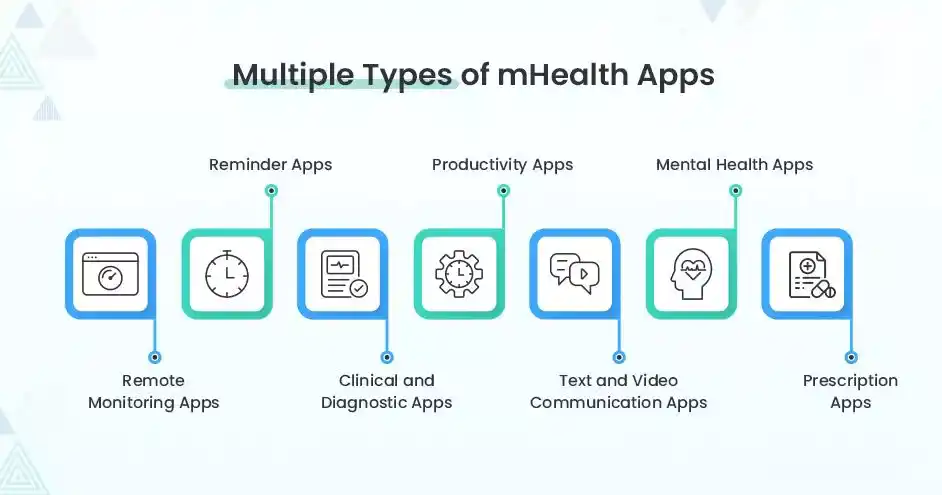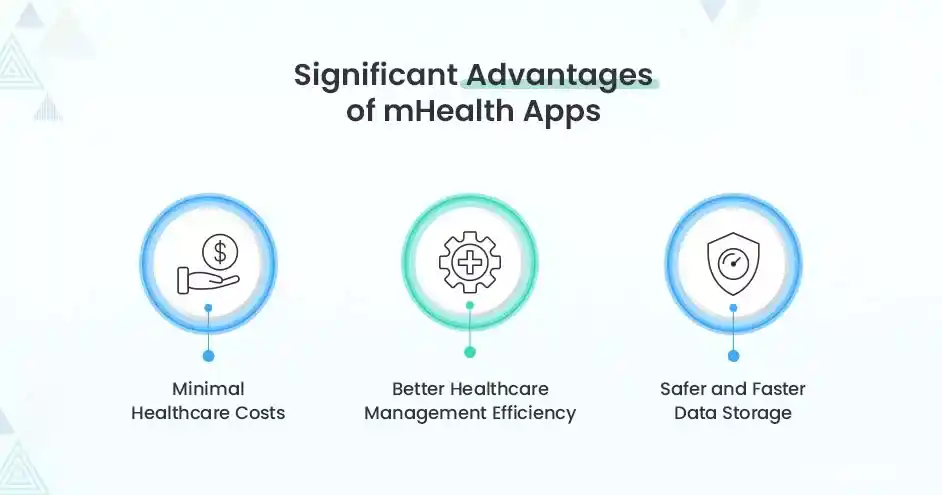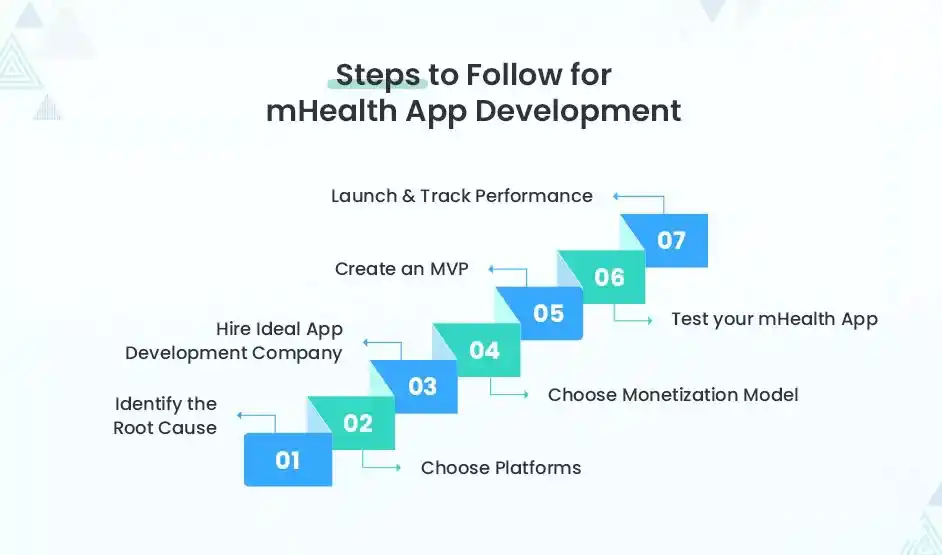Table of Contents
In the 21st century, mHealth apps have emerged as powerful tools reshaping the landscape of healthcare. These innovative applications leverage mobile technology to empower individuals in managing their health, facilitating remote consultations, and enhancing access to medical information. From personalized wellness tracking to advanced telemedicine solutions, mHealth apps are at the forefront of improving healthcare delivery.
Explore the dynamic trends driving this transformation and discover how these apps are revolutionizing patient care and promoting a healthier society.
What is mHealth?
mHealth, or mobile health, is revolutionizing healthcare by seamlessly integrating cutting-edge technology into medical practices. Unlike its predecessor, eHealth, mHealth harnesses the power of smartphones and mobile devices to deliver efficient and accessible healthcare solutions. These apps serve as a comprehensive platform, allowing healthcare providers to gather real-time clinical information and community data, streamlining patient care processes.
Over the years, a myriad of Mobile health applications have emerged worldwide, catering to diverse medical needs and preferences. From facilitating direct communication with healthcare professionals to personalized meal planning and medication management, these apps simplify healthcare management for users.
Examples include FitOn, Pillow, Lose It!, Clue, and Welltory, each offering unique features tailored to enhance wellness and disease management. With Mobile health applications, accessing quality healthcare is no longer bound by long queues or geographical constraints, ushering in a new era of patient-centric care and medical innovation.
Different Types of mHealth Apps

- Remote Monitoring Apps: mHealth Apps empower patients with remote access to healthcare. They facilitate continuous communication between patients and doctors, enabling monitoring of vital signs like blood pressure, oxygen levels, and heart rate. This digital care reduces the need for frequent clinic visits while ensuring timely intervention and personalized medical attention.
- Reminder Apps: mHealth apps go beyond default alarms on mobile devices. Reminder apps, a fundamental type of Mobile health applications, prompt users about appointments, medication schedules, and more. While they can be standalone, they’re often integrated into broader health apps. These tools play a crucial role in enhancing patient adherence and overall healthcare management.
- Clinical and Diagnostic Apps: mHealth Apps aid healthcare professionals in collecting, analyzing, and exchanging health data, including electronic records, lab results, and digital imaging. They empower both patients and medical experts to verify symptoms, identify issues, and collaborate on effective treatments, revolutionizing healthcare delivery in the digital age.
- Productivity Apps: Efficient Mobile health applications streamline healthcare providers’ tasks, offering home healthcare schedules, mobile planning, and remote dictation. These apps prioritize HIPAA compliance, providing unique features for enhanced productivity.
- Text and Video Communication Apps: Empowered by high-tech innovations, healthcare providers and patients alike embrace mHealth Apps for video consultations, on-call services, and messaging. These mobile platforms facilitate seamless communication, fostering stronger connections between patients and medical professionals. By promoting accessibility and enhancing communication, such apps significantly improve patient care standards in modern healthcare.
- Mental Health Apps: Mobile health applications, specifically mental health apps, enhance therapy accessibility and effectiveness. Through tailored development, these apps combat insomnia, anxiety, stress, and depression. They employ pre-recorded meditations, calming music, gamification, breathing exercises, and more to provide flexible support for mental well-being.
- Prescription Apps: mHealth Apps empower medical professionals to prescribe accurate medication regimens and dosage, ensuring patient safety and minimizing side effects. They enable swift adjustments or cancellations of prescriptions, optimizing treatment plans for enhanced healthcare outcomes.
Benefits of mHealth Apps

- Minimal Healthcare Costs: The emergence of mHealth apps is significantly reducing healthcare costs. Unlike traditional healthcare systems requiring expensive infrastructure, these apps offer cost-effective solutions. By leveraging mobile technology, the medical industry delivers essential services at minimal maintenance expenses. Additionally, patient-centric features empower individuals to manage their healthcare digitally, further optimizing costs.
- Better Healthcare Management Efficiency: Mobile health applications have drastically reduced micromanagement expenses in healthcare. Gone are the days of face-to-face appointments and paper prints, replaced by efficient mobile solutions. Healthcare CRM software development enables seamless patient interaction and resource management for medical specialists, leading to enhanced overall efficiency and cost reduction.
- Safer and Faster Data Storage: Efficient mHealth apps streamline data storage, ensuring security and accessibility. Traditionally, gathering patient data is labor-intensive, but mobile apps simplify the process. Patients securely share sensitive health information, accessible only to authorized medical professionals. This modern approach saves time and effort, facilitating safer and faster data management in healthcare.
Related Article:
Types of Healthcare Software Development: A Comprehensive Guide for 2024
How to Build a mHealth App?

- Understand Client Needs – Delve deep into client requirements, identifying issues that mHealth apps can solve. Choose a medical field focus.
- Select Platforms – Opt for Android, iOS, or web platforms for deployment.
- Hire Reliable Developers – Engage a competent healthcare software development team for integrated solutions, including UI/UX, development, and marketing expertise.
- Choose Monetization – Explore subscription-based or freemium models to generate revenue.
- Build MVP – Develop a Minimum Viable Product for testing and user feedback before market launch.
- Test Thoroughly – Conduct comprehensive testing to identify and fix bugs, enhancing app affordability and reputation.
- Launch and Monitor – After thorough testing, launch the app and track its performance for continuous improvement.
The Transformative mHealth Trends
The 21st century witnesses a remarkable evolution in mHealth app trends, revolutionizing healthcare delivery. These innovations offer unprecedented accessibility, personalized care, and data-driven insights, transforming the patient experience. From remote monitoring to AI-powered diagnostics, Mobile health applications empower individuals to take control of their health.
As these trends continue to advance, they hold immense promise for improving healthcare outcomes globally, fostering a healthier and more connected society in the digital age.